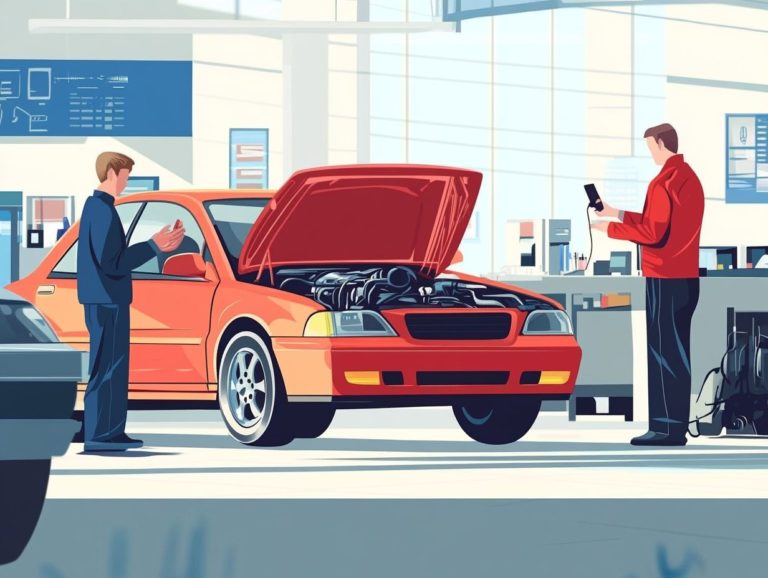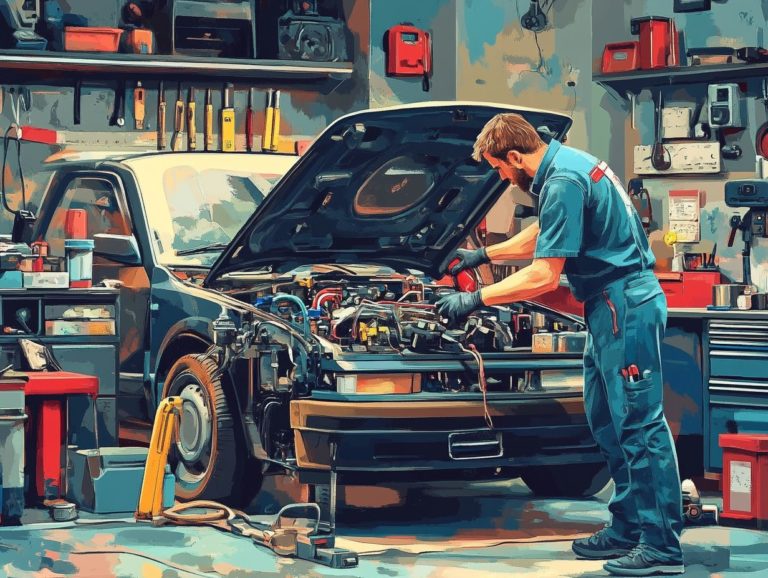Top 10 Car Maintenance Tips for Longevity
Maintaining your car goes beyond mere aesthetics; it s crucial for its longevity and peak performance. From routine oil changes to checking those all-important brake pads, every facet of car care contributes significantly to your vehicle s overall health.
This guide offers you ten essential maintenance tips designed to help you sidestep costly repairs and elevate your driving experience. You ll also discover the signs that indicate your car needs attention and how diligent upkeep can save you money over time. Jump in and discover how easy it is to extend your vehicle’s life!
Contents
- Key Takeaways:
- 1. Regularly Check and Change Your Oil
- 2. Keep Your Tires Inflated and Rotated
- 3. Replace Your Air Filter
- 4. Check and Replace Your Spark Plugs
- 5. Keep Your Car Clean
- 6. Replace Your Timing Belt
- 7. Check and Replace Your Brake Pads
- 8. Get Your Car Serviced Regularly
- 9. Keep Your Car Covered When Not in Use
- 10. Use High-Quality Fuel and Additives
- What Are the Signs That Your Car Needs Maintenance?
- Frequently Asked Questions
- What are the top 10 car maintenance tips for long life?
- Why is it important to regularly change your engine oil?
- How often should I rotate my tires?
- Why is it important to replace your air filter?
- What happens if I don’t address warning lights on my dashboard?
- Do I need to follow my car’s recommended maintenance schedule?
- What can I do to prevent rust on my car?
Key Takeaways:
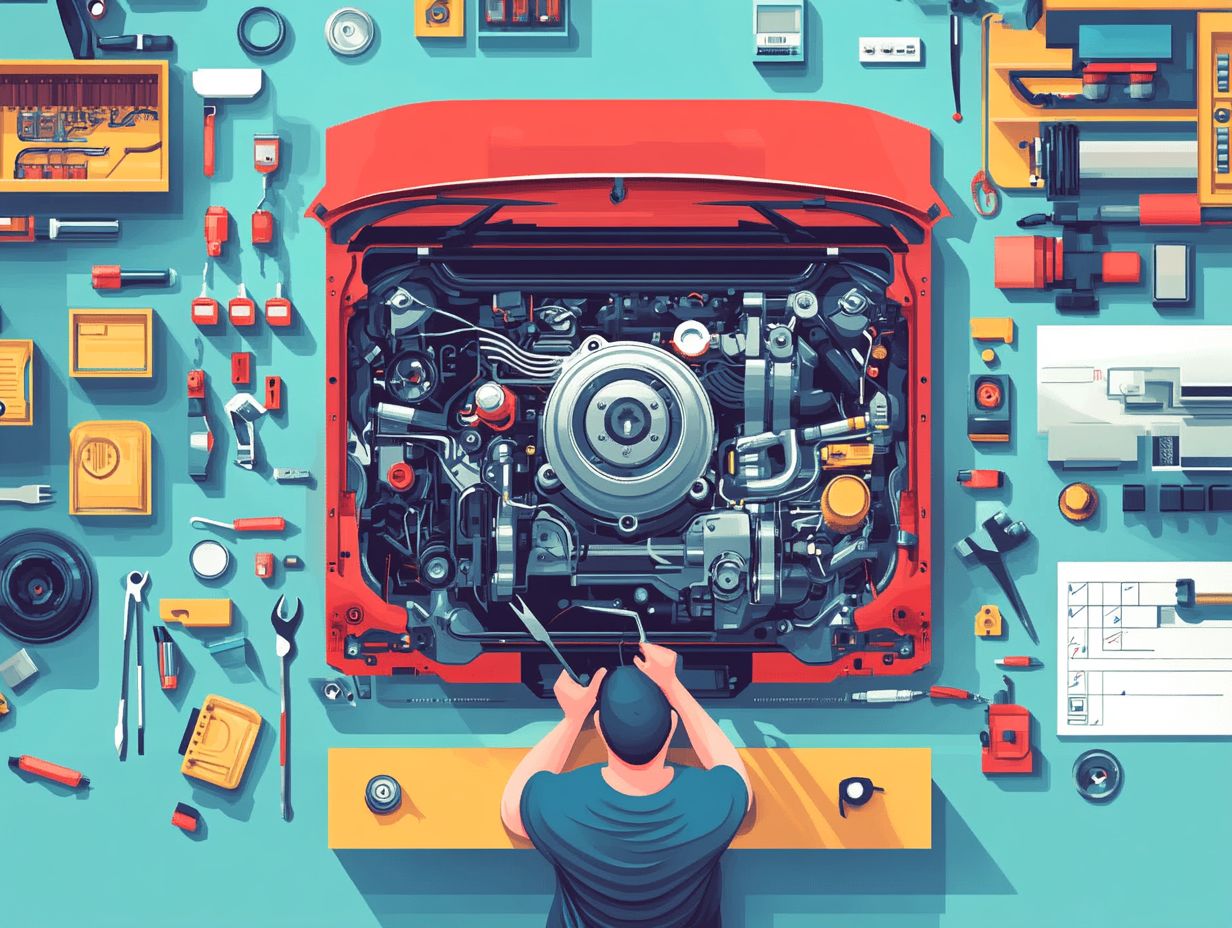
- Change your oil and air filter regularly to boost your car s performance!
- Keep your tires inflated and rotated to save money and enhance road safety!
- Regularly check and replace critical components like spark plugs and brake pads to prevent costly repairs and ensure smooth operation!
1. Regularly Check and Change Your Oil
Regularly checking and changing your oil is essential for effective vehicle maintenance. This routine practice not only keeps your engine healthy but also boosts your vehicle’s overall efficiency and reliability.
At L&O Automotive, we emphasize the importance of sticking to a maintenance schedule that includes timely oil changes with the right oil grades tailored to your specific requirements. Doing so enhances fuel efficiency and significantly prolongs your vehicle’s lifespan.
There are various types of engine oils to consider, including conventional, synthetic, and synthetic blend oils. Synthetic oil is a man-made lubricant that works better in extreme temperatures. For instance, synthetic oils deliver superior protection in challenging driving scenarios, making them ideal for high-performance vehicles.
Experts recommend changing your oil every 3,000 to 5,000 miles under normal driving conditions. In harsher environments, more frequent changes are often necessary. Neglecting this simple maintenance can lead to issues like sludge buildup and reduced fuel efficiency.
Regular fluid checks are equally important, as they help you identify potential leaks and ensure that all critical systems, including coolant and transmission fluid, are functioning optimally, contributing to your vehicle’s long-term health.
2. Keep Your Tires Inflated and Rotated
Maintaining proper tire pressure and rotation is essential for ensuring your vehicle’s longevity and safe driving. When tires are under-inflated or unevenly worn, you’re not just risking increased repair costs; you’re also compromising your road safety.
Regularly check the recommended tire pressure levels, which you can typically find in your owner s manual or on a sticker inside the driver s side door. A simple tire pressure gauge is all you need to measure the pressure effectively.
Regular tire rotation is key to distributing wear evenly across all tires. Keep an eye out for signs of tire wear like cracking, bulging, or uneven tread patterns. When in doubt, seek professional guidance at L&O Automotive for expert advice.
3. Replace Your Air Filter
Replacing your vehicle’s air filter is a straightforward yet vital task for maintaining engine performance and efficiency. A clean air filter guarantees optimal airflow while shielding engine components from dust and debris that can cause damage.
While the common wisdom suggests changing it every 12,000 to 15,000 miles, if you frequently navigate d dusty roads or urban environments, you might need to swap it out sooner. A clogged air filter can significantly compromise fuel efficiency.
Incorporate air filter checks into your regular vehicle maintenance routine, alongside oil changes and tire rotations. This will help keep your engine running smoothly and ultimately save you money on fuel while reducing emissions.
4. Check and Replace Your Spark Plugs
Regularly check and replace your spark plugs. This step is crucial for top engine performance. Worn spark plugs can cause poor fuel efficiency and lower power output.
If you notice engine misfiring often felt as rough idling or unexpected power loss assess your spark plugs. Poor acceleration or struggles to start are also signs that an inspection or replacement is needed.
It’s wise to consult professional mechanics who can conduct thorough inspections. Their skilled replacement ensures your engine runs smoothly, helping restore its best performance.
5. Keep Your Car Clean
Keeping your car clean is about more than looks. It prevents corrosion and helps your vehicle last longer.
A clean car is less prone to paint damage and maintains a healthier environment inside.
Detailing and waxing provide added protection against harsh elements, repelling dirt and moisture. Make it a habit to wash your vehicle every two weeks for a sparkling ride!
Maintaining a tidy interior enhances your driving comfort and preserves the resale value of your vehicle.
6. Replace Your Timing Belt
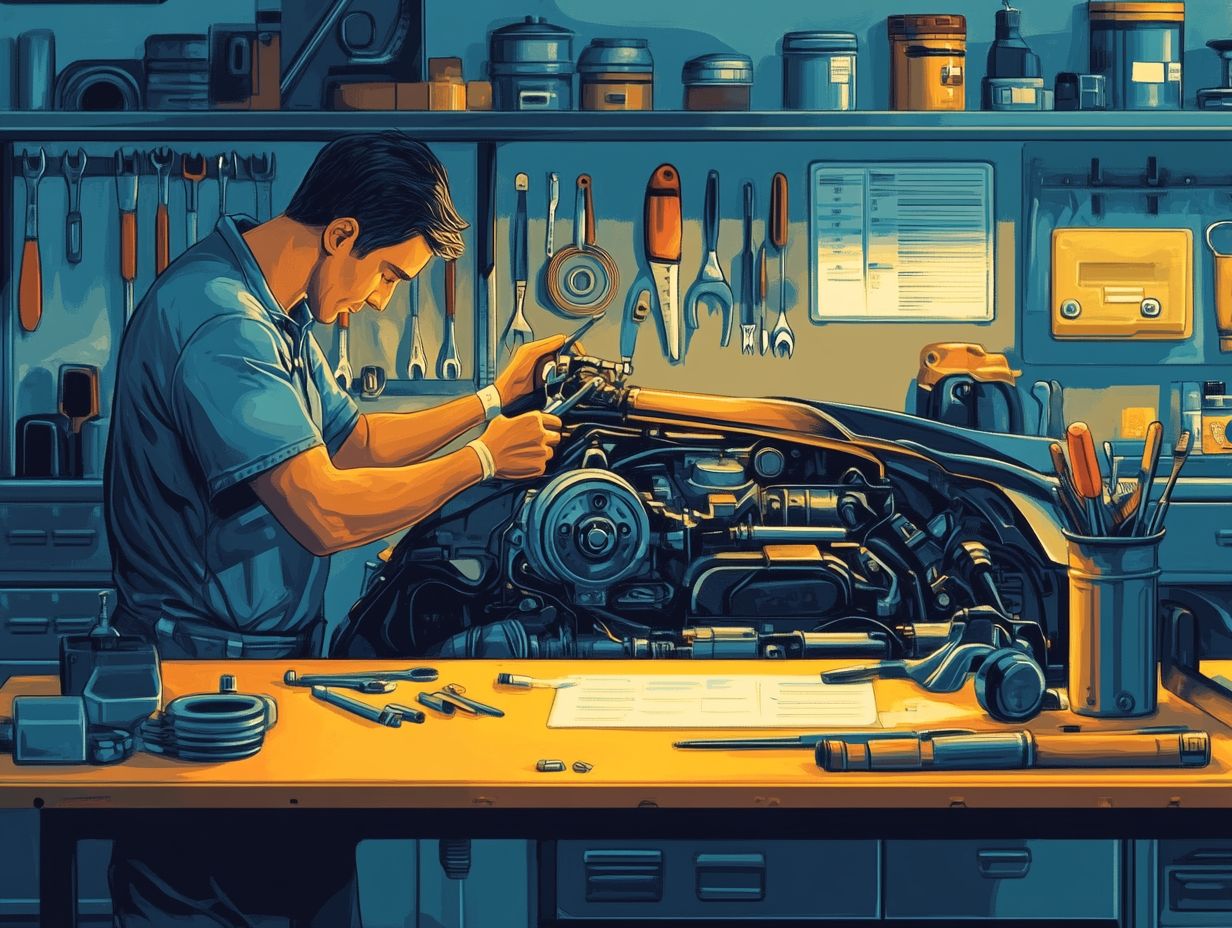
Replace your timing belt regularly for optimal engine performance. A worn belt can lead to severe damage.
Most manufacturers recommend a replacement every 60,000 to 100,000 miles. Check your owner s manual for specifics.
Watch for signs like unusual noises or visible damage. Ignoring these could cost you dearly!
Professional mechanics can accurately assess your timing belt condition and perform replacements efficiently, keeping your vehicle in peak condition.
7. Check and Replace Your Brake Pads
Check and replace your brake pads regularly for safety. Worn pads reduce stopping power and increase accident risk.
Aim for regular inspections every 10,000 to 15,000 miles. Listen for squealing or grinding noises and note any lack of responsiveness.
By making brake inspections a priority, you protect your safety and that of others on the road. This proactive approach can help prevent costly repairs from more extensive damage due to brake failure.
8. Get Your Car Serviced Regularly
Getting your car serviced regularly is essential for maintaining optimal performance and reliability. It ensures that all essential fluids are checked and any minor repairs are addressed before they turn into costly problems.
Along with checking fluids like engine oil, coolant, and brake fluid, routine inspections typically cover vital components such as brake performance and tire condition. By adhering to a structured maintenance schedule, you not only prolong your vehicle’s lifespan but also enhance your safety on the road.
If you’re uncertain about when to schedule these appointments, expert guidance is readily available through L&O Automotive. Contact L&O Automotive now for personalized service recommendations that keep your vehicle in top shape!
9. Keep Your Car Covered When Not in Use
Keeping your car covered when it s not in use is a smart way to shield it from extreme weather conditions that can lead to significant damage over time, ultimately driving up your repair costs.
Various covers are available, including waterproof, UV-resistant, and breathable options. Each is tailored to tackle specific threats from elements like heavy rain, intense sunlight, or snowfall. Choosing the right cover helps you avoid issues such as rust formation, faded paint, and interior damage caused by fluctuating temperatures.
It s important to know your local climate to choose the perfect cover for your car!
When your vehicle is not in use, storing it in a garage or a covered parking area can elevate its protection even further. This minimizes exposure to debris and keeps pesky critters at bay, ensuring your car remains in top-notch condition.
10. Use High-Quality Fuel and Additives
Using high-quality fuel and additives is essential for enhancing your fuel efficiency and maintaining optimal engine performance. Inferior quality fuels can lead to engine deposits and decreased reliability, which is something no driver wants to face.
Choosing the right fuel grade ensures your engine runs smoothly and prevents long-term damage. Different fuel ratings can influence acceleration, power output, and even fuel consumption. This highlights the importance of selecting a suitable grade based on your vehicle’s specifications.
By opting for reputable fuel suppliers, you can ensure the consistency and purity of the fuel, reducing the risk of contaminants that could impact your engine’s performance.
Incorporating additives into your fuel regimen can support engine health by minimizing wear, cleaning critical components, and enhancing overall efficiency. This means your engine can remain in peak condition for years to come, ready to deliver the performance you expect.
What Are the Signs That Your Car Needs Maintenance?
Recognizing the signs that your car needs maintenance is crucial for preventing minor repairs from ballooning into major issues. Timely intervention can save you both time and money while ensuring a safe driving experience.
Pay close attention to any unusual noises, like grinding or squeaking, as these can indicate mechanical problems, particularly with your brakes or suspension. Don t ignore warning lights on your dashboard, such as the check engine light; these can serve as early alerts to underlying issues that need addressing.
Changes in handling like your car pulling to one side or feeling less responsive can also signal that something might be off. Keeping a comprehensive repair history is essential; it helps you track your car’s performance over time.
Professional mechanics are invaluable in these situations. They offer expert insights and ensure that potential problems are diagnosed early, helping to keep your vehicle running smoothly.
How Can Proper Maintenance Save You Money in the Long Run?
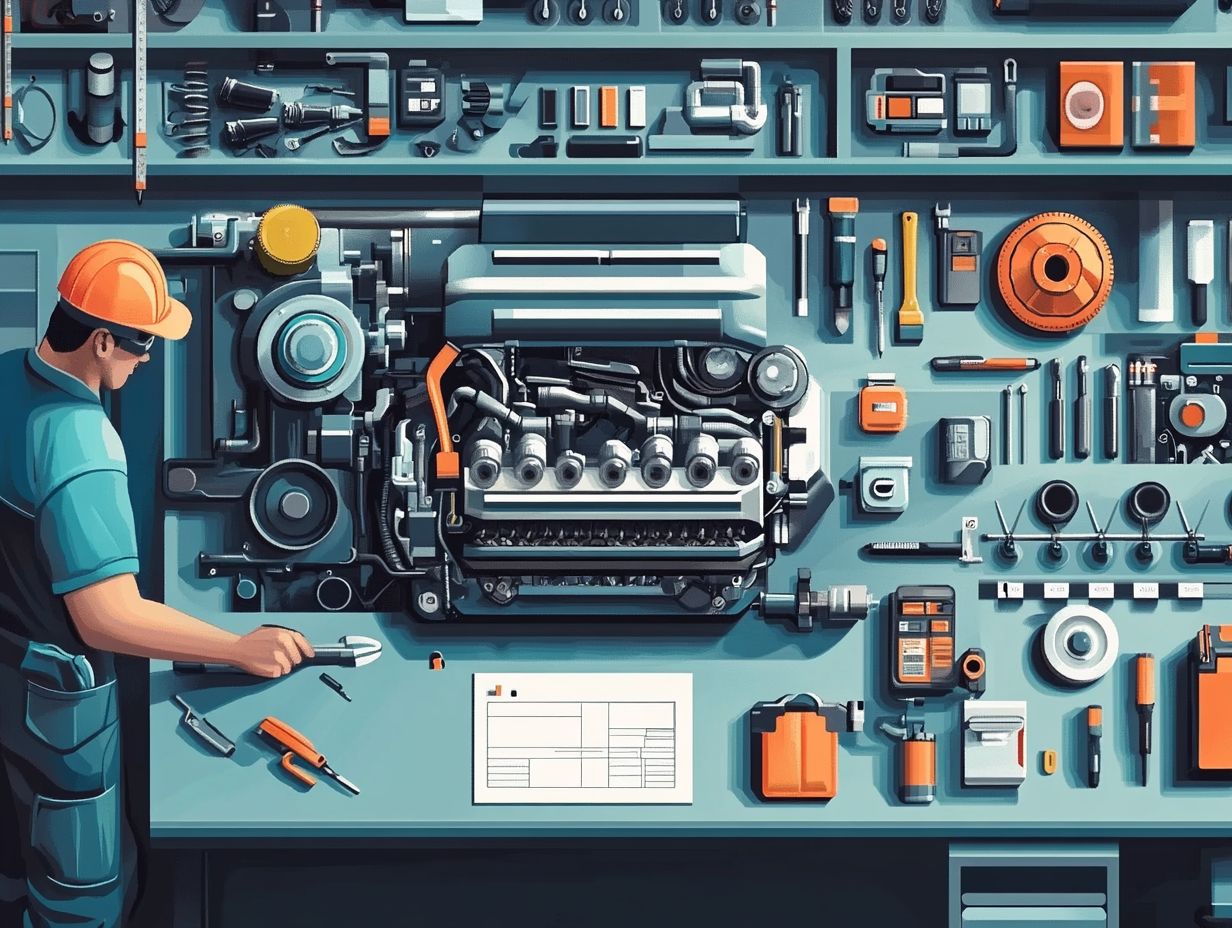
Proper maintenance can lead to significant savings over time by preventing costly repairs and extending your vehicle’s lifespan. This makes it a wise investment for any car owner.
By proactively addressing minor issues like replacing worn-out brakes or regularly changing the oil you can sidestep the hefty expenses associated with big problems. For example, if you neglect a small oil leak, you could end up facing engine damage that requires thousands to repair.
Keeping a detailed maintenance history not only helps you track scheduled services but also acts as a valuable asset when evaluating your vehicle s condition should you ever consider selling it. This detailed record can enhance your resale value, as potential buyers often prefer vehicles with comprehensive maintenance documentation.
What Are the Most Important Parts of a Car to Maintain?
Understanding which parts of your car are most critical to maintain is essential for ensuring optimal performance and safety. Neglecting these components can lead to significant issues and increased repair costs.
Key components such as brakes, tires, and fluids are crucial for the overall health of your vehicle. Brakes are vital for your safety, allowing you to stop effectively in various conditions. Tires ensure proper traction, stability, and even fuel efficiency.
Regularly monitoring your vehicle’s fluids like oil, coolant, and brake fluid is necessary to prevent overheating and maintain optimal engine function. Schedule regular inspections with a professional mechanic to identify wear and tear and gain peace of mind.
This ensures that all these critical parts are operating correctly, ultimately extending your vehicle’s life and enhancing its performance.
How Can Regular Maintenance Improve Your Car’s Performance?
Don’t wait! Regular maintenance boosts your car’s performance, ensuring that all systems operate at their best. This commitment leads to a more reliable driving experience and improved engine efficiency.
When you make routine checks a priority like oil changes, tire rotations, and brake inspections you significantly boost fuel efficiency and promote smoother operation.
You ll likely notice that your car handles more responsively and predictably, especially during turns and sudden stops. Neglecting certain parts can put undue strain on the engine and other crucial components, leading to less-than-ideal performance.
By sticking to a regular service schedule, you not only protect yourself from unexpected mechanical issues but also create an environment where every drive is both enjoyable and efficient.
What Are the Benefits of Following a Maintenance Schedule?
Following a maintenance schedule offers a wealth of advantages, from extending the lifespan of your vehicle to substantially reducing repair costs and enhancing safety making it an essential practice for every car owner.
Regular check-ups allow you to ensure that fluids are topped off, tires are properly inflated, and brake systems receive the attention they need. By sticking to this schedule, you can identify minor issues, such as worn-out brake pads or low oil levels, before they transform into expensive repairs.
This proactive approach not only prevents those inconvenient breakdowns but also contributes to a smoother ride, enhancing fuel efficiency and overall driving pleasure. Well-maintained vehicles often boast a higher resale value, providing an attractive bonus for those contemplating future investments.
How Can You Extend the Life of Your Car Through Maintenance?
Extending the life of your car through maintenance requires a good mix of proper care, regular inspections, and timely repairs. For those looking to minimize expenses, it’s helpful to consider the top 10 cars with the lowest maintenance costs. This ensures that your vehicle remains reliable and efficient for years to come.
By following specific maintenance practices, such as routine fluid changes and thorough vehicle checks, you can significantly enhance your car’s overall performance and longevity. Regular oil changes will prevent engine wear, while best practices for car maintenance ensure that fluid checks are crucial for the optimal functioning of essential systems like brakes and cooling. Paying close attention to warning signs during inspections allows you to catch minor issues before they turn into costly repairs.
This proactive approach results in a smoother and safer driving experience. It also minimizes long-term ownership costs, making car maintenance a smart investment.
Frequently Asked Questions
What are the top 10 car maintenance tips for long life?
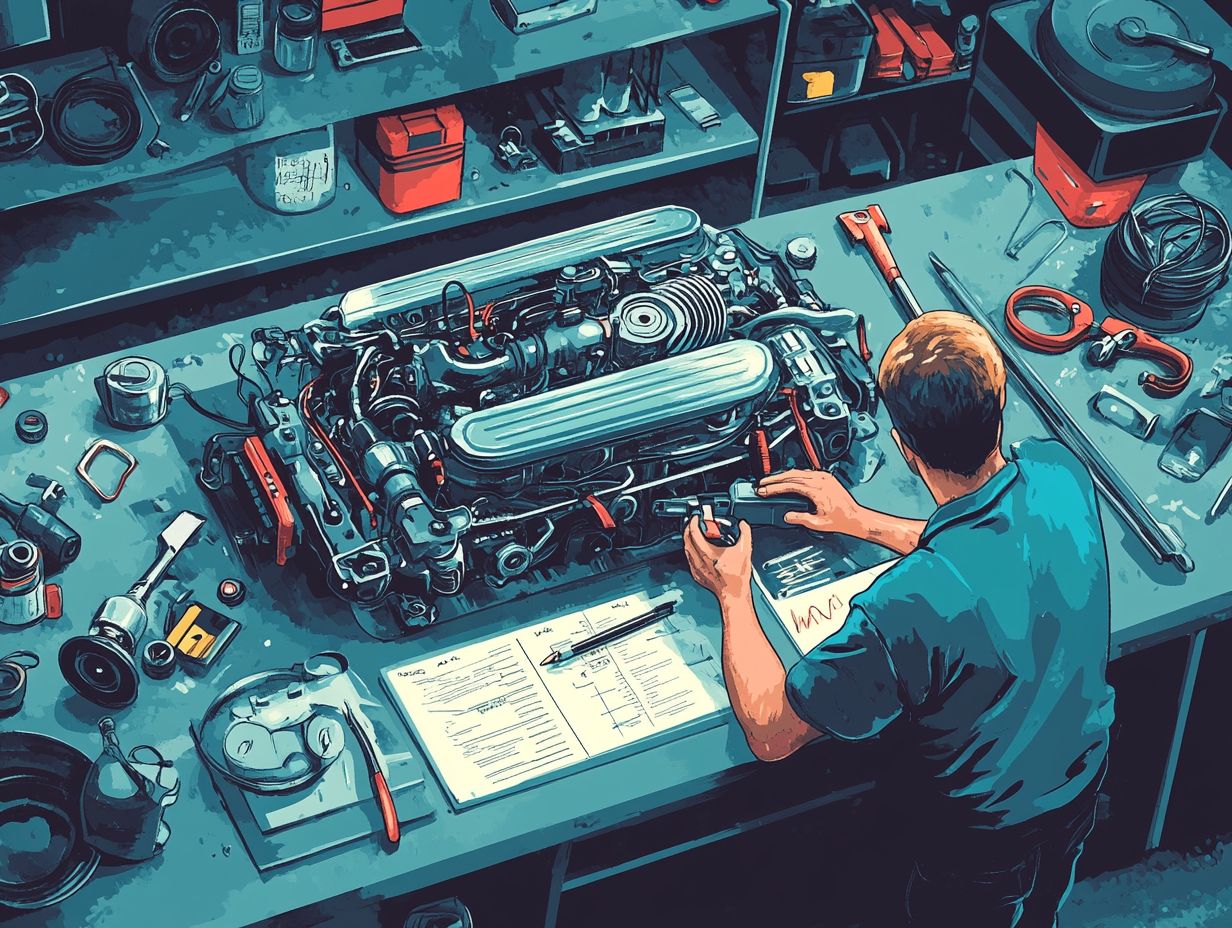
- Regularly change your engine oil and filter.
- Keep an eye on your tire pressure and rotate your tires every 5,000 miles.
- Replace your air filter every 12,000 miles or as recommended by your car’s manual.
- Check and replace your spark plugs according to your car’s maintenance schedule.
- Maintain your fluids, such as coolant and brake fluid, at the recommended levels.
- Inspect and replace your belts and hoses as needed.
- Don’t ignore warning lights on your dashboard! Address any issues immediately.
- Get regular tune-ups and inspections to catch potential problems early.
- Keep your car clean inside and out to prevent rust and other damage.
- Follow your car’s maintenance schedule and stay on top of necessary repairs.
Why is it important to regularly change your engine oil?
Regularly changing your engine oil and filter removes dirt, debris, and contaminants from your engine. This allows it to run smoothly and efficiently, preventing potential damage and extending your car’s life.
How often should I rotate my tires?
Rotate your tires every 5,000 miles for even wear and to prolong their lifespan. However, this may vary based on your car’s make and model, so check your owner’s manual for the recommended interval.
Why is it important to replace your air filter?
A clean air filter is essential for your engine to function properly. It prevents dirt and debris from entering the engine, which can cause damage and decrease its lifespan. Regularly replacing your air filter can also improve fuel efficiency.
What happens if I don’t address warning lights on my dashboard?
Ignoring warning lights can lead to further damage and potentially more expensive repairs. Fix any issues right away to keep your car safe and in good working condition.
Do I need to follow my car’s recommended maintenance schedule?
Yes! Following your car’s recommended maintenance schedule is crucial for prolonging its life. It helps keep your car running at its best and catches problems before they become serious.
What can I do to prevent rust on my car?
Keeping your car clean, both inside and out, is key to preventing rust. Wash and wax the exterior regularly and clean the undercarriage to remove any road salt or debris. Address any scratches or paint chips promptly to prevent rust from forming.
Start your car maintenance today for a smoother ride tomorrow!


